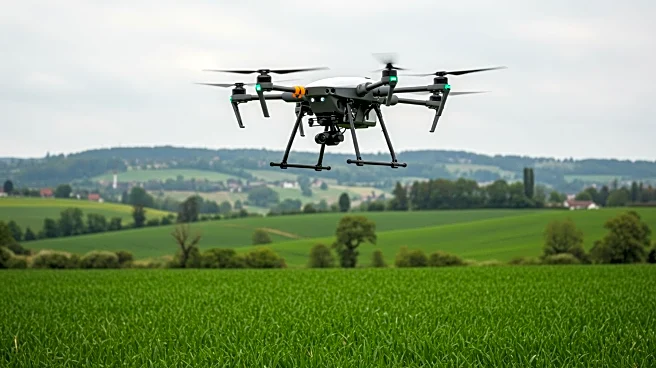What's Happening?
The Agriculture Technologies Market is anticipated to grow significantly, reaching a projected market size of USD 102.6 billion by 2033. This growth is driven by advancements in digital tools and automation, including precision farming, AI-driven analytics, IoT, drones, and autonomous machinery. These technologies enhance crop yield, resource management, and operational efficiency, helping farmers monitor soil health, optimize irrigation, and track crop performance in real-time. The increasing global demand for food and the need for sustainable farming practices are key factors driving the adoption of agriculture technologies. Additionally, the trend of vertical farming and controlled-environment agriculture is opening new avenues for growth. Governments and enterprises are investing in agri-tech solutions to address climate change, food security, and resource depletion.
Why It's Important?
The expansion of the Agriculture Technologies Market is crucial for addressing global challenges such as food security and climate change. By adopting advanced technologies, the agricultural sector can improve productivity and sustainability, reducing waste and enhancing resource management. This growth benefits farmers, agribusinesses, and governments by providing tools to optimize operations and meet the increasing demand for food. The market's expansion also presents opportunities for technology companies and investors, as innovations in agriculture technology continue to evolve. The focus on sustainable practices aligns with global efforts to combat climate change and ensure food security, making this market a pivotal area for future development.
What's Next?
As the Agriculture Technologies Market continues to grow, stakeholders can expect further investments in research and development to enhance existing technologies and introduce new solutions. Governments may implement policies to support the adoption of sustainable farming practices, while agribusinesses could expand their operations to incorporate advanced technologies. The market's growth may also lead to increased collaboration between technology providers and agricultural entities, fostering innovation and improving efficiency. Additionally, the focus on vertical farming and controlled-environment agriculture may drive new business models and opportunities for entrepreneurs in the agri-tech sector.
Beyond the Headlines
The rise of agriculture technologies presents ethical and cultural implications, particularly in terms of data privacy and the impact on traditional farming practices. As technology becomes more integrated into agriculture, concerns about data ownership and the potential loss of traditional farming knowledge may arise. Additionally, the shift towards automated and AI-driven solutions could affect employment in the agricultural sector, necessitating discussions on workforce adaptation and training. The long-term impact of these technologies on rural communities and cultural heritage should be considered as the market continues to evolve.










